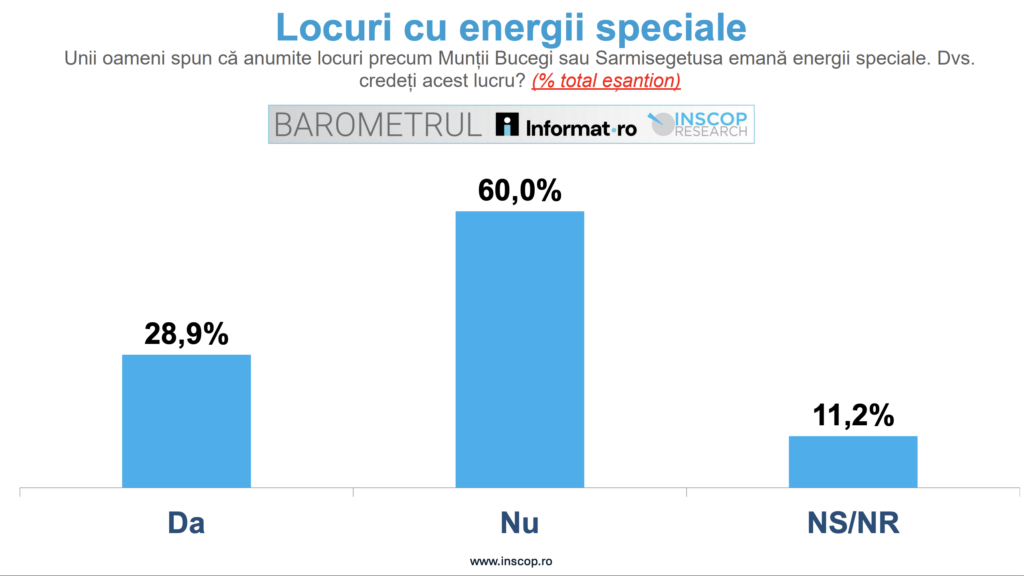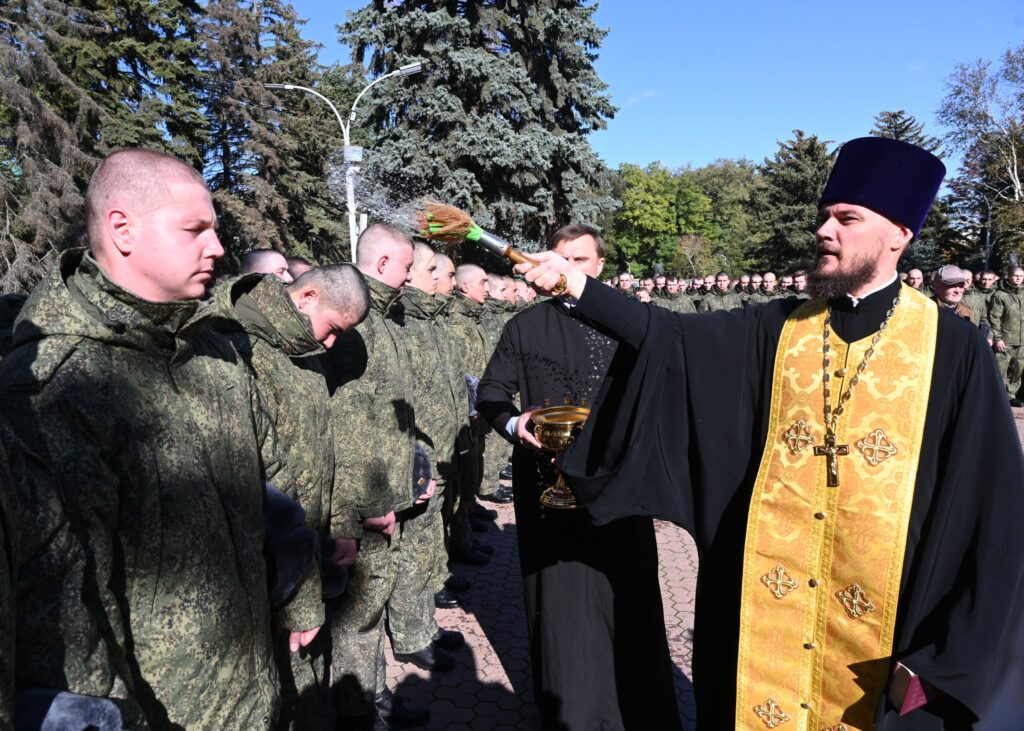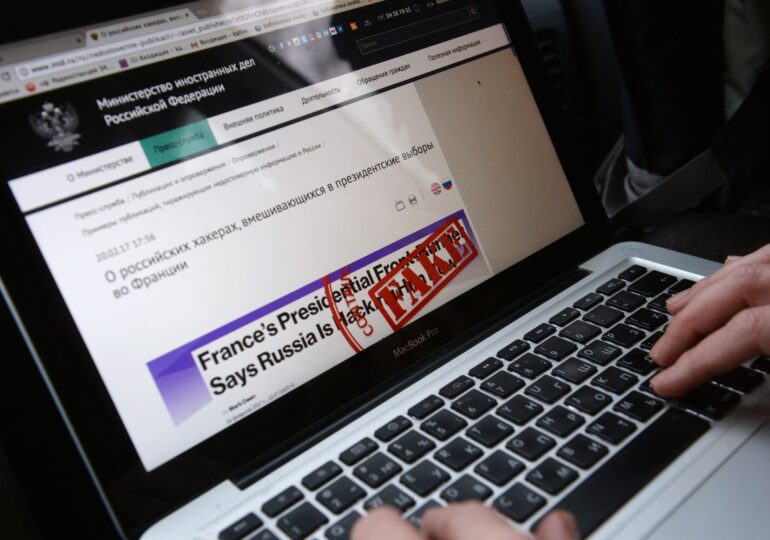At the beginning of this week, INSCOP, through Remus Ștefureac – the director of the public opinion polling agency, presented a study about spells and esotericism, about their impact among the population in Romania.
- Over half of Romanians believe in global conspiracies and the influence of luck in life – INSCOP survey and infographics
- Over half of Romanians believe in „energetically charged” places. The INSCOP study shows that education does not change esoteric beliefs
It is an interesting sociological research that has sparked a debate bringing into focus how Romanians relate to faith, luck, conspiracies, and other phantasmagorical practices that many believe help them cope with life’s challenges.
A lot of data is being shared with the public that has not yet been methodically explained by experts, signaling a real issue regarding how the population relates to reality and how this relationship is affected by subjective positions, some of which create dangerous situations in society.
This study also includes a component related to conspiracy theories. We know that these are widely used in hybrid warfare by Russia and others to achieve strategic objectives.
They are extensively used to create currents of opinion in political confrontations, to push segments of the population in a certain direction, so that an ideological project or decision can be more easily adopted and have popular support.
Conspiracy theories, an organized phenomenon
For example, a domain heavily affected by conspiracy theories is that of health, the anti-vaccine movement, accelerated by the pandemic, continues to wreak havoc both in Romania and the USA, as well as in European countries.
There is a resurgence of once-eradicated epidemics, such as scarlet fever, measles, and others, in the context where many parents refuse to vaccinate their children. This has created a social danger that is difficult for authorities to manage.
"From my experience, we are dealing with a phenomenon that is no longer spontaneous, but organized. I'll give a personal example: in 2008, when the campaign for the HPV vaccine was launched, I publicly spoke about it. I was instantly bombarded with dozens of coordinated messages, identical in structure, against the vaccine. The campaign failed," said Vlad Petreanu, a TV and radio show host, during the study presentation conference.
"Then, in 2018, the family referendum, from my point of view, served as an electoral calibration exercise for the same vulnerable population," he further noted.
"...with the pandemic and social networks, the mechanism has become refined and exploded. What we are experiencing is not a coincidence. It is a long-term process, which results in the erosion of democracy, the isolation of Romania, and the breakdown of trust between people. That is the real stake," Vlad Petreanu added.
The spread of fear
Starting from here, from the widely used conspiracy theories, the debate shifts to the front line of hybrid warfare.
For example, in Romania, according to the study, 42.6% of the population believes in invisible energies - aura, chakras, bioenergy - that influence health.
Moreover, over 50%, precisely 51.4% of the population, believes that there are places in Romania energetically charged that influence the physical and mental state of people.
Almost 30% of the population - precisely 28.9% - believes that certain places, such as the Bucegi Mountains or Sarmizegetusa, emit special energies.

Many of these data are the result of the hybrid warfare conducted on social networks. The currents of opinion in which many of our peers end up being convinced that extraordinary events are happening are non-information, fake news, intensively promoted in Romania on social networks for years.
The question that arises is why a foreign entity, such as Russia, has created such an infrastructure to spread false information and generate certain currents of opinion? The main objective of such an attack is to spread fear and distrust in society to weaken it.
The energies of the Bucegi Mountains
Conspiracy theories are launched to test the population - how gullible and vulnerable to certain messages they are, for which you need to build a network of accounts to promote false information. Creating such a network and attracting supporters requires a story.
"As an anthropologist studying magic and witchcraft for over 30 years in Romania - both rural and urban - I can say that the magical area is alive and persistent. Romania is not a global exception, but it has high numbers," said Camelia Burghele at the study presentation event.
"We must start from a fundamental element: magical thinking is specific to the traditional Romanian village. For centuries, the inexplicable was explained through magic. The reverberation of this way of thinking in the urban environment is still visible today," she added, stating that this specific magical thinking has helped conspiracy theories to quickly gain followers.
In the logic of hybrid warfare, an approach is used where a sensational story is presented, such as the one about the tunnels in the Bucegi Mountains, which starts from the idea of national exceptionalism: the ancient populations in this territory, the Dacians, Thracians, and others, had supernatural, magical powers passed down through the centuries, so the places are imbued with a certain energy.
Elements that capture attention are needed. The key is to capture attention. Something out of the ordinary must be conveyed so that, in the deluge of information, the subject stands out.
Once attention is captured, various other pieces of information can be delivered on the architecture created on social networks.
Russia's interest is to push anti-European messages and themes that create social tensions. Alongside a story about special energies in the Bucegi Mountains, another can easily be attached, suggesting that COVID is an invention, thus fueling increasingly violent reactions, protests against the measures taken by authorities in the pandemic to protect the population.
Social tension arises, negative reactions towards authorities, and the establishment of distrust, leading to the breakdown of social cohesion and the ability of institutions to fulfill their role.
A marginal issue that has become a disease
In the absence of action by authorities and a certain type of regulation on social networks, an army of trolls and operators of entities hostile to a country, a political regime, or a person has effectively emerged, with the objective of spreading and intensifying conspiracy messages to provoke social tensions, instill distrust, and destroy any form of solidarity at the level of democratic states.

This was a problem that state authorities were obligated to address long ago. There have been numerous alerts issued by journalists, communication experts, and specialists in the digital space, but political leaders and institutional heads considered it a marginal issue for a long time, until it spread like cancer, becoming chronic.
Thus, we have reached a critical point. We are in a situation where political systems are threatened, democratic elections are undermined, and companies, communities, individuals are destroyed. Although the defense reaction is timid, there is still a long way to go before coming out of the crisis.

